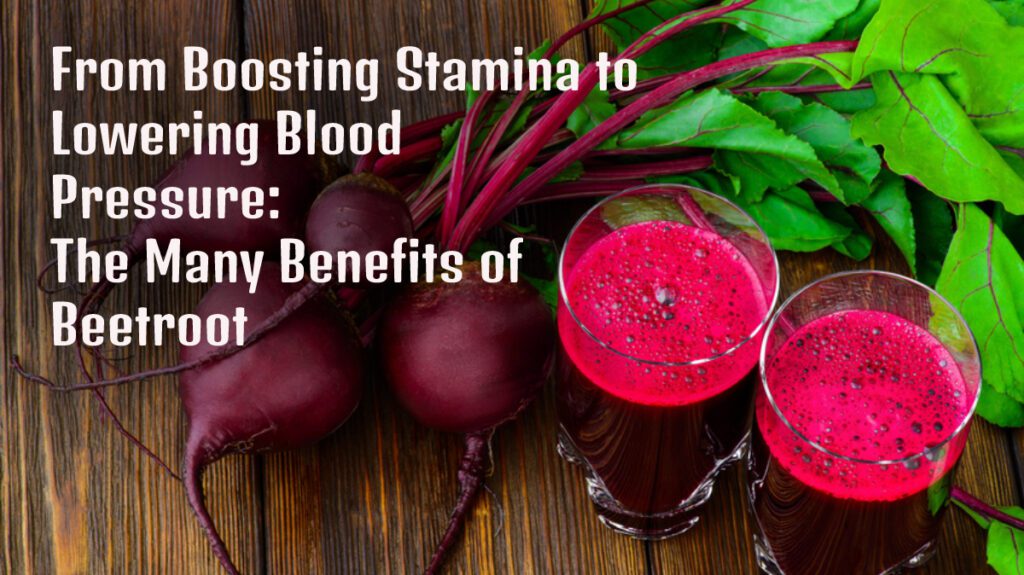Beetroot: The Key to a Healthy Heart and More

Beetroot: A Nutritious and Versatile Root Vegetable Beetroot, also known as beets, is a root vegetable that is packed with nutrients and health benefits. This deep red vegetable is not only delicious but it can also be eaten in a variety of ways, from roasted and boiled to pickled and juiced. Here’s why you should […]
Beetroot: A Nutritious and Versatile Root Vegetable
Beetroot, also known as beets, is a root vegetable that is packed with nutrients and health benefits. This deep red vegetable is not only delicious but it can also be eaten in a variety of ways, from roasted and boiled to pickled and juiced. Here’s why you should consider adding beetroot to your diet:
Nutritional Value of Beetroot
Beetroot is a good source of fiber, vitamins, and minerals, including folate, potassium, manganese, and vitamin C. One cup of cooked beetroot contains:
Calories: 59
Carbohydrates: 13 grams
Fiber: 3.8 grams
Protein: 2.2 grams
Fat: 0.2 grams
Vitamin C: 6% of the daily value (DV)
Folate: 34% of the DV
Potassium: 9% of the DV
Manganese: 16% of the DV
Potential Health Benefits of Beetroot
May Help Lower Blood Pressure
Beetroot contains high levels of nitrates, which are converted to nitric oxide in the body. Nitric oxide helps to relax and dilate blood vessels, which can lead to a reduction in blood pressure. In fact, studies have shown that drinking beetroot juice can lead to a significant reduction in blood pressure in people with hypertension.
May Improve Exercise Performance
The nitrates in beetroot can also improve exercise performance by enhancing the delivery of oxygen and nutrients to muscles. Drinking beetroot juice has been shown to improve endurance and performance in athletes, as well as reduce the amount of oxygen needed during exercise.
May Have Anti-Inflammatory Properties
Beetroot contains antioxidants and anti-inflammatory compounds that may help to reduce inflammation in the body. Inflammation is thought to be a contributing factor in a range of chronic diseases, so eating foods that can help to reduce inflammation is important for overall health.
May Improve Digestion
The fiber in beetroot can help to promote digestive health and regularity. It can also help to prevent constipation and reduce the risk of colon cancer.
May Support Brain Health
Beetroot contains nitrates that may improve blood flow to the brain, potentially improving cognitive function. Studies have shown that drinking beetroot juice can lead to improvements in reaction time and cognitive function in older adults.
May Support Liver Health
Beetroot has been shown to have a protective effect on the liver, potentially reducing the risk of liver disease. It can also help to improve liver function and detoxification.
Ways to Add Beetroot to Your Diet
There are many ways to incorporate beetroot into your diet. Here are a few ideas:
- Roast or boil beetroot and serve as a side dish.
- Grate raw beetroot and add to salads or sandwiches.
- Pickle beetroot for a tangy snack.
- Juice beetroot for a nutritious and refreshing drink.
- Use beetroot powder as a natural food coloring.
Conclusion
Beetroot is a nutritious and versatile root vegetable that offers a range of health benefits. Whether you prefer it roasted, boiled, pickled, or juiced, adding beetroot to your diet is a great way to improve your overall health and well-being.
By: AyuSutras





प्रातिक्रिया दे